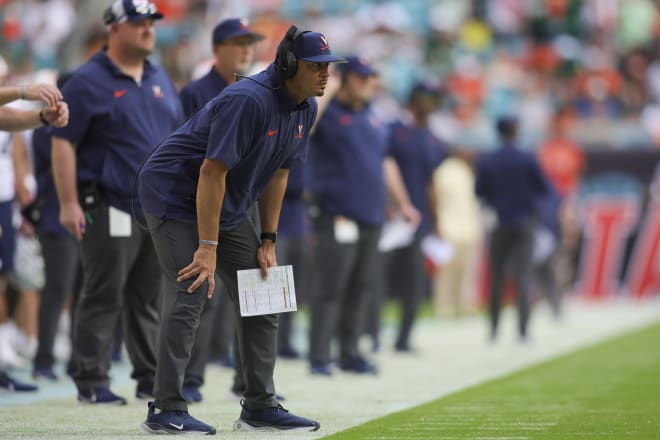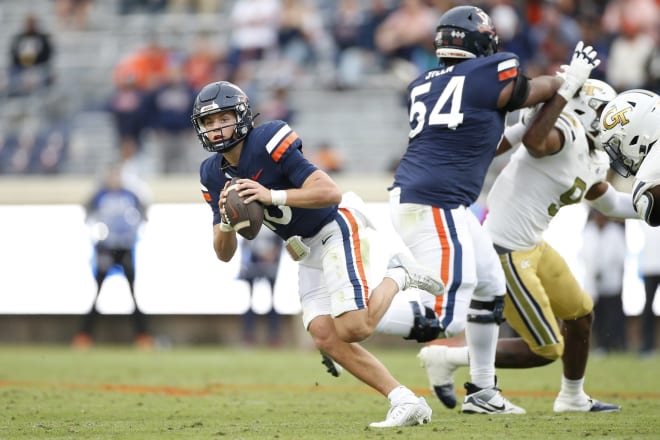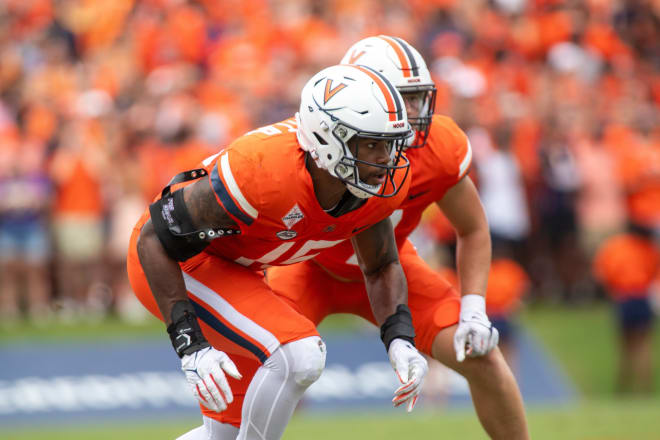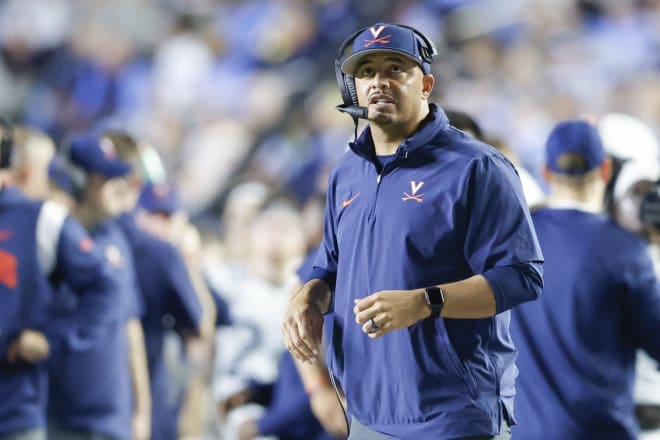Across the Beat: Getting to know Virginia

Duke snapped a seven-year losing streak against Virginia last year and is looking to make it two wins in a row against its former Coastal Division rival.
Virginia is 2-8 this season, its second under Tony Elliott. Growth can be seen without looking too hard, though; the Cavaliers’ lone ACC win was at the venue where Duke just lost (UNC), and four of UVA’s losses have come against bowl-eligible teams by single digits (N.C. State, Boston College, Miami and Louisville, along with a one-point loss against undefeated James Madison).
To get to know more about the Cavaliers, we’ve enlisted the help of Justin Ferber, editor-in-chief of Cavs Corner on the Rivals network.
Here is our five-part Q&A:
1. I like to start these with a simple vibe check. Knowing the record is less than ideal, how is the mood around this program?
Answer: This is a really difficult one to answer, really, given the events of the last year. The program had to recover from last year's tragic shooting that cut the season short, and the impact of that event lingered long into the offseason, and has been part of this team's story. And there's really no way to have a big picture conversation about UVa football without mentioning that, given the weight the players and staff have had to carry since last November.
With that said, UVa football is in what feels like a limbo state right now, as we don't know if this is headed for a slow and steady turnaround, or if what we've seen thus far is what they're going to continue to get. It's the second year of the Tony Elliott era, and even before last year's tragedy that ended the season, Year One was unfolding much worse than the fanbase and oddsmakers expected. And as expected, plenty of players and a few coaches left, and this year, it does feel like there's more buy-in from the players on this staff's vision.
Still, they need to start winning games because the fanbase isn't won over at this point. Elliott is 5-15 overall and 0-6 at home in ACC games. UVa has been really close and has played a difficult schedule this year (every team on their schedule is .500 or better and all of the FBS programs have a good shot at bowl eligibility if they haven't already earned it). The win over UNC felt like it could be a turning point for this staff, but they haven't won since despite being close as big underdogs in a pair of road games.
Frankly, this is a program that needs momentum. Recruiting hasn't really picked up under the new staff, there hasn't been much of a buzz with the fanbase, on top of all of the other things the program has dealt with of late. This season isn't quite a lost cause yet as wins over Duke, and more importantly Virginia Tech, could give the staff and program a big boost heading into a pivotal offseason before a make-or-break 2024 campaign.

2. Anthony Colandrea might be the most exciting player in the ACC for reasons that both help and hurt UVA. Have there been signs of him taking better care of the ball, or is that something that’ll have to improve over the offseason?
Answer: He certainly is an adventure, isn't he? Still, given his youth and the fact that he wasn't a sure-fire star as a recruit, his play as a true freshman has to be seen as a win for the program and perhaps something for this staff to hang their hat on for the future. Unlike Tony Muskett, the currently injured starter, Colandrea is more of a freelancer, and makes quite a number of off-schedule plays, with scrambles and extending plays. Obviously that has gotten him into trouble at times, and often, at the worst possible times. Half of UVa's turnovers this season have come in the red zone, and Colandrea INTs are a good number of those giveaways.
In the Louisville game, Colandrea was much smarter with the football and didn't force a ton of throws that weren't there. His one interception was actually a well-thrown ball that the Cards defender simply ripped away from the receiver. Still, Virginia has a thin margin for error, and while Colandrea can make plays happen, the team can't afford the ones he's giving away to the opponent. I would chalk his turnovers up to youth and his desire to make plays for his team and help them win, and I think he has a good chance to do a better job protecting the ball as his career unfolds.
3. It looks like a clear correlation between UVA running the ball well in its two wins — 221 yards against William & Mary and 228 against UNC — and struggling in the losses (averaged 94.1 yards). What worked in the wins that hasn’t translated?
Answer: This UVa staff has been clear that they want to run the ball since they arrived in Charlottesville, the problem has been in the execution. Simply put, the blocking has been hit-and-miss, and both run and pass blocking issues have been the cause of many of UVa's struggles on offense over the past two seasons. In those back-to-back wins, UVa opened up holes and were able to control the game by moving the chains on the ground consistently.
They didn't hit many big runs, but took four or five yards consistently. Muskett started both of those games, and while Colandrea can make plays with his legs to be sure, Muskett's ability to keep the ball on read option plays gave defenses one more thing to have to stop, and it helped open up the entire running game.
UVa has had moments on the ground this season, but they haven't been consistently good in that area. It also doesn't help that they've played from behind quite a bit, and have had to go to the air more in those situations. Heading into this weekend, UVa's ground game may struggle again, as starter Perris Jones suffered a serious neck injury at Louisville and is still in the ICU recovering from spinal surgery. Mike Hollins has been banged up, too, but should be able to play this week. Colandrea may be called upon to be the team's leading rusher again this weekend, as he was at Louisville last week.

4. What happened to this team’s pass rush? Last year UVA had 30 sacks, this year it has 10.
Answer: I think last year's pass rush numbers were in part due to the play of the secondary, which created some coverage sacks. Fentrell Cypress (now at FSU) and Anthony Johnson (Green Bay Packers) were excellent in the first year with this defensive scheme, and it allowed UVa to get after quarterbacks a bit more with trust in the secondary to prevent big plays. This year, UVa has a lot of the same players in the front seven, minus star linebacker Nick Jackson, who was a solid pass rusher himself. But the success simply hasn't translated.
There are some injury-related reasons for that, too. Chico Bennett, arguably UVa's best pass rusher, hurt his knee in fall camp and missed the start of the season. Defensive end Kam Butler suffered a season-ending injury in September against NC State, and both Paul Akere and Ben Smiley have missed games with injury, too.
Still, even at full strength, it feels like UVa isn't even close to getting pressure most of the time. That caused defensive coordinator John Rudzinski to dial up more linebacker blitzes, which have helped a bit but hasn't changed things too much. Ultimately, if UVa is going to have success on defense, it's probably going to be from stopping the run on early downs, and hanging on when 3rd down arrives, and try to make a play in the secondary if they can't get pressure.

5. It seems like there have been steps forward for this program, while several more need to be taken. What has to happen between now and next season to set up for a bowl berth (if that’s the goal for next year)?
Answer: The first step is to win more non-conference games. The Hoos went 1-3 in the non-con this year, and that's never a recipe for success in the ACC. Next year, UVa plays at Notre Dame and Coastal Carolina, while hosting Maryland and Richmond, so it won't be a walk in the park, but they need to get at least two wins there. They also need to do a better job protecting home field, something they haven't done in the Elliott era, with just one win (a 16-14 win on a last-second field goal against a bad ODU team last year) vs FBS competition in two years at Scott Stadium.
UVa also needs to get better line play on both sides of the ball. The offensive line could conceivably return everyone next year, and their young group has made some strides throughout this season, but there's still work to do. And you mentioned the pass rush, it's hard to imagine they can't do a better job there.
And the one big change I would like to see them make is with special teams, where they've been anywhere between mediocre and horrible throughout the Elliott era. UVa has had two punts blocked and recovered for touchdowns, and gave up a long kick return touchdown to Maryland. There have been plenty of other mistakes here and there on special teams too, including a leaping penalty at the end of the N.C. State game that allowed the Wolfpack to kick again, and ultimately win the game on the final play of regulation. I don't know if Elliott will make a coaching change there or reassign current special teams coach Keith Gaither to just coaching running backs, but all options should be considered.